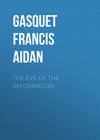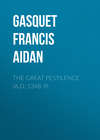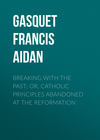Czytaj książkę: «English Monastic Life», strona 4
1. THE ABBOT
The title abbot (abbas) means father, and was used from the earliest times as a title appropriate to designate the superior of a religious house, as expressing the paternal qualities which should characterise his rule. St. Benedict says that “an abbot who is worthy to have charge of a monastery ought always to remember by what title he is called,” and that “in the monastery he is considered to represent the person of Christ, seeing that he is called by His name.” The monastic system established by St. Benedict was based entirely upon the supremacy of the abbot. Though the Rule gives directions as to an abbot’s government, and furnishes him with principles upon which to act, and binds him to carry out certain prescriptions as to consultation with others in difficult matters, etc., the subject is told to obey without question or hesitation the decision of the superior. It is of course needless to say that this obedience did not extend to the commission of evil, even were any such a command ever imposed. Upon this principle of implicit obedience to authority depended the power and success of the monastic system, and in acknowledging the supreme jurisdiction of the superior, whether abbot or prior, all pre-Reformation religious Orders agreed.
It is useful at the outset to understand how the abbot was chosen. According to the monastic rule, he was to be elected by the universal suffrages of his future subjects. In practice these could be made known in one of three ways: (1) By individual voting, per viam scrutinii; (2) by the choice of a certain number, or even of one eminent person, to elect in the name of the community, a mode of election known as electio per compromissium; and (3) by acclamation, or the uncontradicted declaration of the common wish of the body. Prior, however, to this formal election there were certain preliminaries to be gone through, which varied according to circumstances. Very frequently the founder or patron, who was the descendant of the original founder of the religious house, had to be consulted, and his leave obtained for the community to proceed to an election. In the case of many of the small houses, and, of course, of the greater monasteries, the sovereign was regarded as the founder; and not unfrequently one condition imposed upon a would-be founder for leave to endow a religious house with lands exempt from the Mortmain Acts, was that, on the death of the superior, the convent should be bound to ask permission from the king to elect his successor. This requirement of a royal congé d’élire was frequently regarded as an infringement of the right of the actual founder, but in practice it appears to have been maintained very generally in the case of houses largely endowed with lands, as a legal check upon them, rendered fitting by the provision of the Mortmain Acts. Moreover, on the death of the superior, the king took possession of the revenues of his office, which were administered by his officials till, on the confirmation of his successor, the temporalities were restored by a royal writ. In some cases this administration pertained only to the portion of the revenues specially assigned to the office of superior; in others it appears to have included the entire revenue of the house, the community having to look to the royal receiver for the money necessary for their support.
In practice the process of election in one of the greater monasteries on the death of the abbot was as follows. In the first place the community assembled together and made choice of two of their number to carry their common letter to the king, to announce the death and to beg leave to proceed to the election of a successor. This congé d’élire was usually granted without much difficulty, the Crown at the same time appointing the official charged with guarding the revenues of the house or office during the vacancy. On the return of the conventual ambassadors to their monastery, the day of election was first determined, and notice to attend was sent to all the religious not present who were possessed of what was called an “active voice,” or the right of voting, in the election. At the appointed time, after a Mass De Spiritu Sancto had been celebrated to beg the help of the Holy Ghost, the community assembled in the chapter-house for the process of election. In the first place was read the constitution of the General Council —Quia propter– in which the conditions of a valid election were set forth, and all who might be under ecclesiastical censure or suspension were warned that they not only had no right to take part in the business, but that their votes might render the election null and void.
After this formal preparation the community determined by which of the various legitimate modes of election they would proceed, either the first or second method being usually followed. When all this actual process of election had been properly carried out and attested in a formal document, the community accompanied the newly chosen superior in procession to the church, where his election was proclaimed to the people, and the Te Deum was sung. The elect was subsequently taken to the prior’s lodgings, or elsewhere, to await the result of the subsequent examination as to fitness, and the confirmation. Meantime, if the newly chosen had been the acting superior, he could still continue to administer in his office, but could not hold conventual chapter, or perform other functions peculiar to the superior, until such time as he had been confirmed and installed. If he was not the acting superior, he was required to remain in seclusion, and to take no part in administration until after his installation.
Immediately after the process of election had been duly accomplished and the necessary documents had been drawn up, some of the religious were despatched to the king to obtain his assent to the choice of the community. In the event of this petition being successful, the next step was to obtain confirmation from the ecclesiastical authority, which might either be the bishop of the diocese, or in the case of exempt houses, the pope. In either case the delegates of the community would have to present a long series of documents to prove that the process had been carried out correctly. First came the royal licence to choose; then the formal appointment of the day of election; the result of the election, and the method by which it was effected; the letter signed by the whole community, requesting confirmation of the elect in his office, and sealed by the convent seal; the royal assent to the election, and finally an attested statement of the entire process by which it had been made.
The ecclesiastical authority, upon the reception of these documents, proceeded to an examination of the formal process, and questioned the delegates both as to this, and as to their knowledge of the fitness of the elect for the office. If the result was not satisfactory, the pope or bishop, as the case might be, either cancelled the election or called for the candidate in order to examine him personally as to “doctrine and morals,” and as to his capability of ruling a religious house in spirituals and temporals. In the event of the election being quashed, the authority either ordered a new election, or, on the ground of the failure of the community to elect within a definite period a fit and proper superior, appointed someone to the office.
The ecclesiastical confirmation of the election was followed, after as brief an interval as possible, by the installation. In the case of an exempt abbey, a delay of some weeks was inevitable, sometimes until the return of the messengers from the Curia, and thus occasionally the office of superior was necessarily kept a long time vacant. If the superior was to hold the abbatial dignity, before his installation he received the rite of solemn benediction at the hands of the diocesan. This was generally conferred in some other than the monastic church, probably because until after installation, which was subsequent to the abbatial blessing, the new abbot was not supposed legally to have any position in the house he was afterwards to rule.
On the day appointed for the solemn installation, the abbot, walking with bare feet, presented himself at the church door. He was there met by the community and conducted to the High Altar, where, during the singing of the Te Deum, he remained prostrate on the ground. At the conclusion of the hymn, he was conducted to his seat, the process of his election and confirmation was read, together with the episcopal or papal mandate, charging all the religious to render him every canonical obedience and service. Then one by one the community came, and, kneeling before their new superior, received from him the kiss of peace. The ceremony was concluded by a solemn blessing bestowed by the newly-installed abbot standing at the High Altar.
The position of the abbot among his community may be summed up in the expression made use of by St. Benedict. He takes Christ’s place. All the exterior respect shown to him, which to modern ideas may perhaps seem exaggerated, if not ridiculous, presupposes this idea as existing in the mind of the religious. Just as the great Patriarch of Western monachism ordered that obedience was to be shown to a superior as if it were obedience paid to God himself, and “as if the command had come from God,” so reverence and respect was paid him for Christ’s love, because as abbot – father – he was the representative of Christ in the midst of the brethren. In all places, for this reason, external honour was to be shown to him. When he passed by, all were to stand and bow towards him. In Chapter and refectory none might sit in their places until he had taken his seat; when he sat in the cloister no one might take the seat next to him, unless he invited him so to do. In his presence conversation was to be moderated and unobtrusive, and no one might break in upon anything that he might be saying with remarks of his own. Familiarity with him was to be avoided, as it would be with our Lord himself; and he, on his part, must be careful not to lower the dignity of his office by too much condescending to those who might be disposed to take advantage of his good nature; nor might he omit to correct any want of respect manifested towards his person. He was in this to consider his office and not his natural inclinations.
The abbot is to occupy the first place in the choir on the right-hand side. During the Office his stall is to be furthest from the altar, the juniors being in front of him, and placed nearest to the sanctuary steps. At Mass, however, the position is changed, the abbot and seniors being closest to the altar, for the purpose of making the oblations at the Holy Sacrifice, and giving the blessings. Whenever a book or other thing is brought to him, the book and his hand are to be kissed. When he gives out an Antiphon, or sings a Responsory, he does so, not as the others perform the duty in the middle of the choir, but at his own stall; and the precentor, coming with the other cantors and his chaplain, stand round about him to help him, if need be, and to show him honour. When the abbot makes a mistake and, according to religious custom, stoops to touch the ground as a penance, those near about him rise and bow to him, as if to prevent him in this act of humiliation. He reads the Gospel at Matins, the Sacred Text and lights being brought to him. He gives the blessings whenever he is present, and at Mass he puts the incense into the thurible for the priest, and blesses it; gives the blessing to the deacon before the Gospel, and kisses the book after it has been sung. The altar, at which he offers the Holy Sacrifice of the Mass, is to be better ornamented than the other altars, and he is to have more lights to burn upon it during the Holy Sacrifice. If his name is mentioned in any list of duties all bow on hearing it read out in the Chapter, and they do the same when he orders any prayers to be said or any duty to be performed, even should he not be present when the order is published.
The whole government of every religious house depended upon the abbot, as described by St. Benedict in the second chapter of his Rule. He was the mainspring of the entire machine, and his will in all things was supreme. His permission was required in all cases. All the officials, from the prior downward, were appointed by him, and had their authority from him: they were his assistants in the government of the house. In the refectory he alone could send for anything, and could allow anyone to be admitted to the common table. The meal was not to begin till after the reading had commenced and he had given the sign to the refectorian to ring the signal-bell. He might send a dish to any one of the brethren whom he thought stood in need of it, and the brother on receiving it was to rise and bow his acknowledgment.
In early times the abbot slept in the common dormitory in the midst of the monks. His duty it was to ring the bell for the community to rise; and, indeed, when any ringing was required for a public duty, he either himself rang the call, or stood by the side of the ringer till all were assembled for the duty, and he gave the sign to cease the signal. To emphasise this part of his duty, in some Orders, at the abbot’s installation the ropes of the church bells were placed in his hands. It was naturally the abbot’s place to entertain the guests that came to the monastery, and he frequently had to have his meals served in his private hall. To these repasts he could, if he wished, invite some of the brethren, giving notice of this to the superior who was to preside in his place in the refectory. On great days in some houses, like St. Mary’s, York, after the abbot had been celebrating the Office and Mass in full pontificals, it was the custom for him to send his chaplain to the door of the refectory to ask the sacred ministers who had served him, with the precentor and the organists, to dine with him.
When the abbot had been away from the monastery for more than three days, it was the custom for the brethren to kneel for his blessing and kiss his hand the first time they met him after his return. When business had taken him to the Roman Curia or elsewhere, for any length of time, on his home-coming he was met in solemn procession by the entire community who, having presented him with holy water, were sprinkled, in their turn, by him. They conducted him to the High Altar, chanting the Te Deum for his safe return, and received his solemn blessing.
Whilst all reverence was directed to be given to him, he on his part was warned by the Rule and by every declaration, that he must always remember the fact that all this honour was paid not to him personally, but to his office and to Christ who was regarded and reverenced in him.
He, above all others, was to be careful to keep every rule and regulation, since it was certain that where he did not obey himself, he could not look for the obedience of others; and that though he had no one set over him, he was, for that reason, all the more bound to claustral discipline. As superior, he had to stand aloof from the rest, so as not unduly to encourage familiarity in his subjects. He was to show no respect for persons; not favouring one of his sons more than another, as this could not fail to be fatal to true observance and to religious obedience. “In giving help he should be a father,” says one Custumal; “in giving instruction, he should speak as a teacher.” He should be “ever ready to help those who are striving after the higher paths of virtue.” He should not hesitate “to stimulate the indifferent to earnestness, and to use every means to rouse the slothful.” To him specially the sick are committed, that he may by his visits console and strengthen them to bear the trials God has sent them.
He must, in a word, “study with paternal solicitude the character, actions, and needs of all the brethren; never forgetting that he will one day have to render to God an account of them all.”
2. THE CLAUSTRAL PRIOR
The prior, or second superior of the house, is above all things concerned with the observance and internal discipline of the monastery. He is appointed by the abbot after hearing the opinions of the seniors. Sometimes, as at Westminster and St. Augustine’s, Canterbury, he was chosen with great deliberation. In the first place, three names were selected by the precentor and by each of the two divisions of the house, the abbot’s side of the choir and the prior’s side. These selected names were then considered by a committee of three appointed by the abbot, who reported their opinion to him. Finally, the abbot appointed whom he pleased.
In all places and duties the prior’s place is next after the abbot. He is to be honoured by all; when he enters the Chapter or comes to the Collation, all rise and continue standing until he has sat down; when the community are incensed in choir, he is to have that mark of respect paid to him, next after the priest who is vested in a cope. “The prior,” says one Custumal, “ought to be humble, kindly in disposition, a living example of religious observance, excellent in everything, doing all things like the rest of the brethren. He should be first among the first, and last with the last.”
The reader will perhaps here recall Jocelin of Brakelond’s analysis of the reasons which prompted the choice of Prior Herbert at Bury, in the closing years of Abbot Sampson’s rule: —
“The chapter being over, I being guest-master,” says Jocelin, “sat in the porch of the Guest-hall, stupefied, and revolving in my mind the things I had heard and seen; and I began to consider closely for what cause and for what particular merits such a man should be advanced to so high a dignity. And I began to reflect that the man is of comely stature and of (good) personal appearance; a man of handsome face and amiable aspect; always in good temper; of a smiling countenance, be it early or late; kind to all; a man calm in his bearing and grave in his demeanour; pleasant in speech, possessing a sweet voice in chanting and impressive in reading; young, brave, of a healthy body, and always in readiness to undergo travail for the need of the church; skilful in conforming himself to every circumstance of place and time, either with ecclesiastics or laymen; liberal and social, and gentle in reproof; not spiteful, not suspicious, not covetous, not drawling, not slothful; sober and fluent of tongue in the French idiom, as being a Norman by birth; a man of moderate capacity whom if too much learning should make (one) mad, might be said to be a perfectly accomplished man.”
The prior’s main duty, besides taking the abbot’s place whenever he was absent, and generally looking after the government of the monastery, was to see to the discipline of the house and to maintain the general excellence of observance. This he was to do as much by example as by precept, and he was to make himself loved rather than feared. He was told to endeavour to occupy in a community, what is called in one rule, “the position of the mother of the family.” He stood, as it were, between the father and his sons; and so long as discipline was not harmed, he should not hesitate to be prodigal in kindness and ready to open his heart in friendly intercourse with all who sought his help. “Let him remember,” says one rule, “that the peace of the house depends on him.”
In monasteries where no other disposition was made, after the triple prayer before the night Office had been said, it was the prior’s duty to take a lighted lantern and go first to the dormitory to see that all were up and that none had overslept themselves, and then to perambulate the cloister and the chapels to see that no one had fallen asleep there, and that the altars were ready for Mass. After Compline at night, having given the sign for leaving the church, he himself went out first, and after receiving the holy water at the door from the hebdomadarian, or priest appointed for the weekly duty, stood aside whilst the community filed out into the cloister, and each in their turn, after being sprinkled with the holy water, put on his hood and passed up to the dormitory. When all were gone, the prior was directed to go round the house and cloister, with a lantern if necessary, to see that all the doors were fastened, that the lights were safe for the night, and that all was well and quiet “in the time of the great silence.” He then took the keys of the outer doors with him to the dormitory, and sitting by his bed, waited to retire until all the rest were lying down.
The prior had his regular week for acting as hebdomadarian priest like the rest; but he did not take his turn with the others in reading in the refectory or serving at meals. When he passed along the cloister the brethren were not bound to rise and bow as they had to do to the abbot; but should he wish to sit down anywhere, those near the place were to rise and remain standing until he was seated. As his office was chiefly concerned with the regular discipline, all permissions to be absent from conventual duties, even if granted by the abbot himself, were to be notified to him.
A true prior, it is frequently remarked in the old Custumals, is a blessing to a religious house, and his presence is like that of an angel of peace.
“He should show,” says one English writer, “an example of the patience of holy Job and of the devotion of David. To his subjects he should manifest the religious observance of our holy fathers, so that he, who is first in name, may be ever first in the virtues of patience, devotion, and, indeed, in all the virtues of the religious life.”













